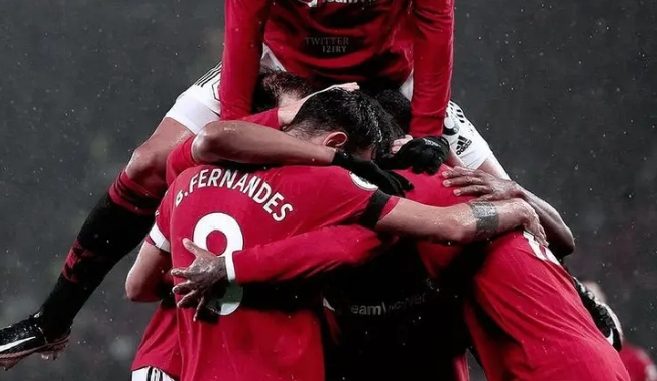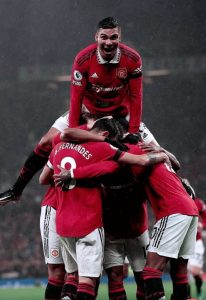
“Manchester United Might Not Be Allowed to Join Liverpool in Next Season’s Champions League”
Manchester United Might Not Be Allowed to Join Liverpool in Next Season’s Champions League
Manchester United are on the cusp of European triumph, but dark clouds loom over their path to the UEFA Champions League. While Liverpool have secured a top-four finish in the Premier League and punched their ticket to Europe’s premier club competition, their arch-rivals Manchester United might not be allowed to join them — even if they win the Europa League. The reason? UEFA’s regulations on multi-club ownership.
As things stand, United are strong contenders to win the 2024/25 UEFA Europa League under new boss Ruben Amorim, and with it, earn an automatic berth into next season’s Champions League. However, with UEFA cracking down on multi-club ownership conflicts, and with United now partially owned by INEOS — who also hold a controlling stake in French club OGC Nice — their qualification is anything but certain.
Let’s break down the complex situation and why Manchester United’s Champions League dreams might be shattered by the rules of the very organisation that governs European football.
—
The Europa League Route: United’s Lifeline?
Manchester United’s domestic form in the Premier League this season has been inconsistent. With just a few games left to play, it’s unlikely they’ll finish in the top five — the traditional route into the Champions League. That leaves the Europa League as their most viable path.
If United were to go all the way and lift the trophy, they would qualify for next season’s Champions League automatically. This is UEFA’s longstanding rule: Europa League winners get a spot in the group stage of the following season’s Champions League, regardless of their domestic standing.
However, there’s a catch — and it’s a big one.
—
INEOS and the Multi-Club Ownership Dilemma
In February 2024, Sir Jim Ratcliffe’s INEOS Group acquired a 27.7% stake in Manchester United, giving them sporting control over the club. However, INEOS also owns OGC Nice, a club that has had a remarkable season in Ligue 1 and is poised to finish inside the French top three — meaning they too are set to qualify for the Champions League.
This is where UEFA’s strict rules come into play. The governing body prohibits two clubs owned by the same entity or individuals from competing in the same European competition in the same season. This is designed to prevent conflicts of interest, match-fixing concerns, and to maintain competitive integrity.
Although INEOS only owns a minority stake in United, their level of influence — control over football operations, appointments, transfers, and infrastructure — may be interpreted by UEFA as de facto control. If both United and Nice qualify, UEFA will have to intervene.
—
UEFA’s Rules on Multi-Club Ownership: The Fine Print
UEFA’s Club Licensing and Financial Fair Play Regulations state clearly:
> “No individual or legal entity may have control or influence over more than one club participating in a UEFA club competition.”
Control or influence is defined as:
Holding a majority of the shareholders’ voting rights
Having the right to appoint or remove a majority of the board
Being able to exert decisive influence in key decision-making processes
Even without majority ownership, INEOS’s operational control of Manchester United might be enough to trigger a violation of this rule. According to UEFA precedent, it’s not just about ownership percentage — it’s about who calls the shots.
—
Historical Precedents: Lessons from the Past
This isn’t the first time UEFA has had to deal with such a situation. In 2018, Red Bull Salzburg and RB Leipzig both qualified for the Champions League. UEFA initially raised concerns since both were owned by Red Bull, but after restructuring governance and ownership to ensure “independence,” UEFA allowed both clubs to participate.
The solution involved altering board compositions, separating decision-makers, and reducing direct financial links. But such restructuring takes time — and UEFA’s deadlines for European registration are strict. Manchester United and INEOS would need to act quickly if both clubs were to make it into next season’s competition.
—
The Nightmare Scenario: United Win the Europa League… But Are Denied Entry
If both Manchester United and Nice qualify for the Champions League, and UEFA determines that INEOS exerts control over both clubs, one of them would be forced to drop down to the Europa League.
UEFA’s hierarchy dictates that the club which qualifies through their domestic league takes precedence. That would be Nice.
This means that even if Manchester United win the Europa League — a European trophy in their hands — they could still be denied access to the Champions League group stage. Instead, they would be relegated to the Europa League, an outcome that would send shockwaves through world football.
—
What Can United Do About It?
Time is running out. Manchester United and INEOS have limited options:
1. Restructure INEOS’s Control: INEOS could reduce their visible operational influence over one of the clubs. This might involve amending board structures, reducing decision-making roles, or even creating independent football operations departments.
2. Sell a Stake: INEOS could divest part or all of their interest in OGC Nice or Manchester United — though the latter is highly unlikely. A rushed sale, however, would be incredibly complex and could devalue assets.
3. Appeal to UEFA: United might hope to argue that the level of influence isn’t enough to breach regulations. But with UEFA tightening rules and a growing pushback against multi-club ownership, that may be a difficult case to make.
4. Hope for a Miracle: If OGC Nice were to drop points and fall out of the Ligue 1 top three, the issue could resolve itself. But that is out of United’s hands — and unlikely.
—
Fans Left in Limbo
For Manchester United fans, the uncertainty adds a bitter taste to what should be an exciting climax to the season. The idea that their team could lift a European trophy and still not compete in the Champions League the following season is almost unthinkable.
It also raises broader concerns about the future of football ownership. Multi-club models are becoming increasingly common — from the City Football Group (Manchester City, Girona, New York City FC) to Red Bull and now INEOS — but UEFA’s willingness to crack down on these structures may signal a turning point.
For now, United fans must hope that a legal or structural workaround can be found — and quickly.
—
Conclusion
Manchester United’s hopes of returning to the Champions League could be undone not by their form on the pitch, but by corporate red tape. As UEFA looks to preserve the integrity of its competitions, the reality of modern football ownership may lead to heartbreak for one of Europe’s biggest clubs.
Unless INEOS and Manchester United can find a viable solution in time, a Europa League victory could end in Champions League exclusion — a bizarre paradox that highlights the new complexities of elite football. With Liverpool safely through, the prospect of United watching from the sidelines only adds another layer to the greatest rivalry in English football.
Will UEFA show flexibility? Or will Manchester United pay the price for the ambitions of their owners?
The clock is ticking.
—
Would you like this pi
ece optimized for SEO, formatted for a blog, or styled for social media use (e.g., Instagram carousel or YouTube narration)?

Leave a Reply